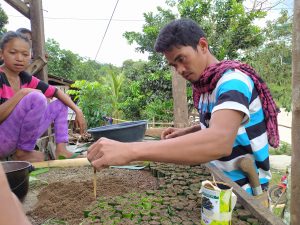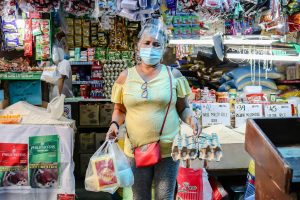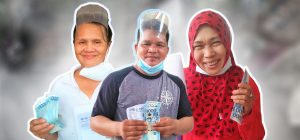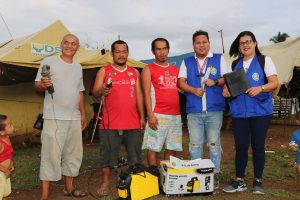Subsistence agriculture is a typical mode of agriculture among the indigenous Higaunon and Kolibugan tribes in Barangay Kalilangan, Iligan City. Farming families till a small farm usually half-hectare (5,000 square meter)

producing mainly food crops for a family and, if lucky to have extra harvest, for the market. Some started to focus on cash crops but the income derived was still not enough to sustain family needs especially for the education of their children.
To increase production, some farmers started to use petrochemical inputs and pesticides. It also increases the cost of production. Some expanded their farms but with limited labor and tools most are only able to expand up to a hectare. Small farms are tantamount to small profit in business.
This started to change when ECOWEB started organizing the indigenous farmers into self-help groups (SHG) of 10 members from 5 families helping each other’s farms. Each family has two members in the SHG – a male and a female.
SHG members are taught to increase diversification of their farms with food and cash crops. They are also taught how to prepare organic fertilizers and insecticides using farm wastes and other organic inputs. Farmers were also taught how to improve the production of their cash crops.

Among the cash crops cultivated by Kalilangan farmers is abaca (Sci. name: musa textilis nee) also known as “manila hemp.” The crop is promoted by ECOWEB as a cash crop in diversified farms because it loves to grow under the partial shading of trees and thrives well with other food-crops.
ECOWEB supports abaca farmers through its project, Formation of Production Guild and Social Enterprises for Economic Development of Indigenous Communities (FPG-SEEDIC) supported by the Germany-based development agency, Bread for the World.
“ECOWEB intend to organize the self-help groups into Production Guilds (PG) producing abaca fiber. This is necessary to help the farmers access better markets of their fiber,” explained Kevin Fernan, the project manager of FPG-SEEDIC. “The project intends to help farmers who already started production and those who are willing to follow the good practices in abaca farming.”
Many farmers in Kalilangan grow abaca in very small scale. But even then, it provides them with a bulk cash income once or twice in a year. ECOWEB looks at this a good indicator that abaca could be a potential cash crop especially that the global demand for natural fiber is consistently increasing in the last 10 years.
“The dominant abaca farming system is still very much at subsistence level. Farmers need assistance to be able to expand and improve their farming system. They are also exploited by traders who buy their product at very low price on the allegation that their abaca fiber is of low quality. Farmers don’t know the standard process to produce good quality fiber,” says Regina Antequisa, Executive Director of ECOWEB. “FPG-SEEDIC will train farmers to do the best practices in abaca farming and the proper procedure of fiber extraction that will produce good quality fiber.”
By the end of December, FPG-SEEDIC was able to organize 68 self-help groups were formed and 10 production guilds were in the process of formation involving 276 farming families.
“We need to transform the subsistence indigenous farmers to farmer-entrepreneurs. We hope to help the farmers transform their farms into family-owned enterprises,” explained Valbert Galorio, the Social Enterprise Development Coordinator of FPG-SEEDIC. “We know that this is not easy because it needs not just transformation of farming practice but also individual attitudes and family dynamics. That’s why we ensure that men and women in the family are involved.”
The long-term goal of FPG-SEEDIC is to establish farmers-owned social enterprises, a goal that Bread for the World committed to support for three (3) years starting 2020. The project implementation was delayed due to the COVID-19 pandemic.
“The road to success is never easy. It requires much determination and willingness to sacrifice. But it is a fact of life,” Kevin Fernan explained. “There is no easy step towards fulfilling your goals, you have to go through a lot of glitches and bumps before you get there.”
Farmers in Brgy. Kalilangan can do so much more with their strong cooperation and participation they will succeed on improving their social status in the stratification and sustain what they have started, it is a bit ambitious but still achievable. In spite of all challenges we have encountered along the process, our willingness prevailed, the raw charm and genuine smile of the community made us forget all of our worries and inspired us to keep on moving. Especially, the fantastic views where land, air and river meet that bring us the experience of a pure joy. This made me realized that the greatest impact of one’s smile is the sense of optimism that radiates from you towards everyone, it gives people spark of hope that no matter how hard things can be, one can survive.



